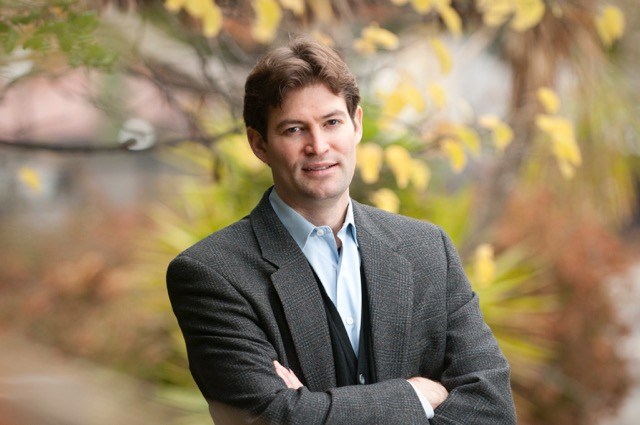I like doing Forecast for a lot of reasons. I get my fingers into the entrails of science in a way that isn’t really possible from reading submissions. I hear some appalling stories, off the record. I’m caught up in the enthusiasm of scientists for what they’re dreaming of discovering in the next decade. But, maybe most of all, I get to ask all kinds of impertinent questions that would rouse the ghost of John Maddox if done during the course of normal editor-scientist interactions.

And so it is with my interview with Noah Diffenbaugh, one of the leading investigators of extreme events in a changing climate, and a friend for over 10 years. Getting to know someone in science, especially after grad school, is weird, as huge chunks of their being remain out of view. Indeed I am often reminded of the blind men and an elephant. Perhaps before I only saw Noah’s enormous feet and extravagant tail, without realizing his true self. I am not at all sure that I do now, but at least it is clear he is a pachyderm.
Noah grew up at the Mount Madonna Center, one of the intentional communities that erupted like mushrooms from the rains of the 1960s’ spiritual and yoga movements. Most withered under divisiveness, absolutism, and isolationism. Mount Madonna, though, continues to thrive. Yes, it was, and is, a yoga and communal life center. But it is not a cult. Instead, it is open to the outside world, and has grown to support a renowned school and series of cultural events.
Mount Madonna’s sense of openness and inquiry are a clear feature of Noah’s work and collaborations. Our work together, on topics like wine and climate, grew from a short chat in an elevator during an NCAR young scientist boot camp. In general, because it’s impossible to tell which collaborations are going to work out, Noah’s default is yes.
Saying yes has clearly worked for Noah. He spent time at Purdue and is now tenured at Stanford, one of the premier universities in the world (and a very tough place to get tenure). Noah’s involved in the IPCC, regularly consults with a huge range of public and private interests, and publishes in Science and Nature. The path to the top was clear, and swift.
Except, no. Noah was an undergrad premed at Stanford. Until he failed, spectacularly, Chem 31. Then it was, almost, a degree in religious studies. But, no. Earth Systems 10 proved riveting and, fortunately for the field (and my own academic career!), Noah turned to science.
At least for a while. Upon graduation, Noah returned to Mount Madonna. He taught at the center’s school but a broader direction eluded; restlessness grew; the benefits and costs of communal life came into sharper focus.
I essentially didn’t go through adolescence and didn’t really leave home until my mid 20s when I was already married and already had a kid
For a lot of us, grad school attracts because it is something to do that seems potentially valuable, interesting and fun, without having to make an absolute choice about what, exactly, you’re committing to. So it was for Noah.
I went to grad school, and I made my grad school decision, for all the wrong reasons … if I ever said out loud my motivation and what I was thinking … I don’t think I would ever get admitted
And leaving home, surprisingly, only meant moving a few miles from Mount Madonna to UC Santa Cruz. Noah eventually settled on paleoclimate research with Lisa Sloan, but only after considering other — and wildly unrelated — options.
Since then, I think the path has been clearer, and Noah has made major contributions to our understanding of extreme heat, among many other topics. Most of our conversation, however, had a decidedly philosophical bent to it, and we wrapped up with a discussion of how the US presidential election at least had the useful outcome of prompting Noah to think about how scientists communicate statistics.
We talked for almost two hours, and still did not get to a lot of topics I wanted to cover (being the chief editor for GRL, life as an academic in Silicon Valley, gender balance in science, non-governmental funding). Editing the interview down to something reasonable took me forever, but I wanted to keep as much as possible. I think the story of Noah’s path through life and science could prove useful, especially for young scientists starting out and wondering if any of your role models also wondered … what am I doing in grad school, why did I pick this advisor, why am I studying this topic, am I really this bad at lab work. Yes. Yes they did. You too might come out the other side.
Music: Solitude, by Broke For Free. CC BY-NC-ND 4.0.